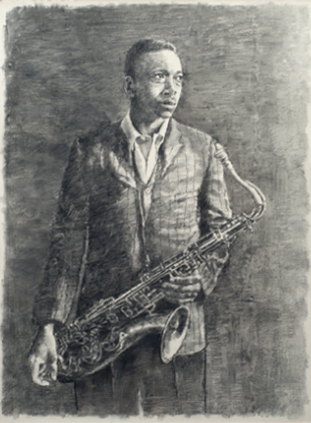John Coltrane
Born in Hamlet, North Carolina in 1926, Coltrane was a jazz saxophonist and composer who threw himself into the free jazz movement, pushing back the boundaries of musical improvisation. Many of Coltrane's musical ideas that shocked the music critics have today been incorporated into the jazz mainstream, as almost every modern jazz player has fallen under his spell. Today, 35 years after his death, Coltrane remains more popular than he was when he was alive.
Charcoal on Linen Paper • Image: 25 x 19 inches • Framed size: 34.75 x 28.75 inches • Price on Request
John Coltrane, also known as "Trane," was born in Hamlet, North Carolina, in 1926. He was an American jazz saxophonist and composer. Working in the bebop and hard bop idioms early in his career, Coltrane helped pioneer the use of modes in jazz and later was at the forefront of free jazz.
Coltrane grew up in High Point, NC, attending William Penn High School (now Penn-Griffin School for the Arts). In 1943 he moved to Philadelphia, Pennsylvania. He enlisted in the Navy in 1945, and played in the Navy jazz band. An important moment in the progression of Coltrane's musical development occurred in 1945, when he saw Charlie Parker perform for the first time. He later recalled, "The first time I heard Bird play, it hit me right between the eyes." Parker became an early idol, and they played together on occasion in the late 1940’s.
Coltrane's big break came in 1955, when Miles Davis asked him to play in his Quintet. In 1959 Coltrane recorded two albums, one with Miles Davis, A Kind of Blue, the other with his own band, Giant Steps. Both albums transformed jazz. He threw himself into the free jazz movement, pushing back the boundaries of musical improvisation.
The Coltrane 'sound' was also shaped consciously and subconsciously by the growing civil rights movement that was sweeping the US in the late 1950’s and 1960’s.Coltrane never described himself as a political activist--he was a musician first and foremost. He was also a deeply religious person. But it was his deep-seated humanity that drew him towards the civil rights movement. In 1963, the killing of four young black girls in a church bombing in Birmingham would move him to write Alabama. In 1964, Coltrane played eight benefit concerts in support of King. He also recorded a number of tracks inspired by the struggle--Reverend King, Backs against the Wall and his album Cosmic Music was dedicated to King.
As is the case with much art that is regarded as avant garde, years later it becomes understood and familiar. Many of Coltrane's musical ideas that shocked the music critics have today been incorporated into the jazz mainstream, as almost every modern jazz player has fallen under his spell. Today, 46 years after his death, Coltrane remains more popular than he was when he was alive.
